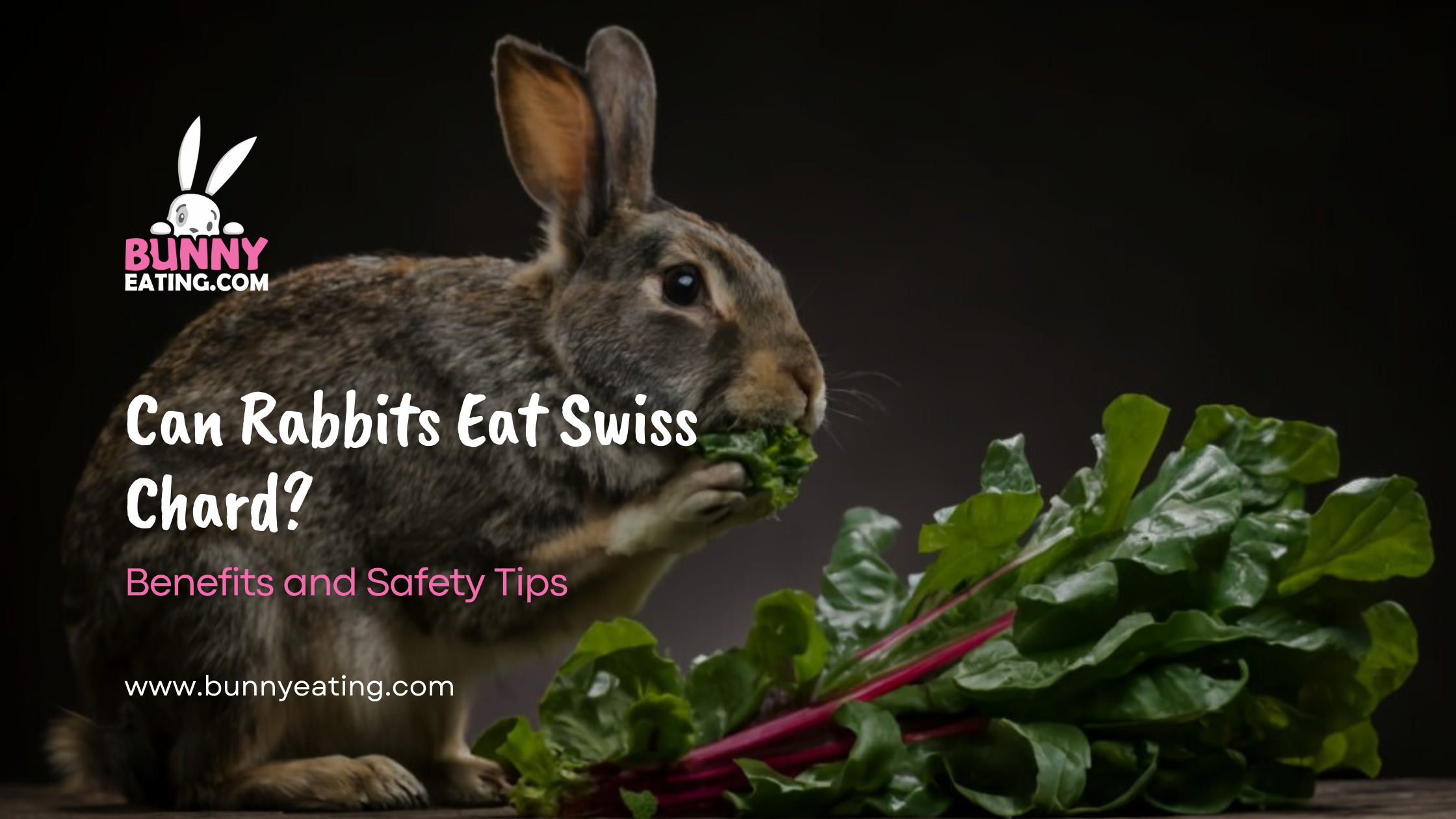Safe Alternative to Rabbits Eating Swiss Chard?
If you’re looking for safe alternatives to Swiss chard for your rabbit, consider vegetables like romaine lettuce, cilantro, and basil. These greens are gentle on your rabbit’s digestive system and provide essential nutrients. Avoid iceberg lettuce as it has little nutritional value and can cause digestive issues. Carrots and bell peppers can also be offered in moderation. Always introduce any new food slowly and watch for any adverse reactions.
Risks of Feeding Swiss Chard to Rabbits?
Effects of Eating Swiss Chard on Rabbits?
Eating Swiss chard in moderation can be beneficial for rabbits. It’s rich in vitamins A, C, and K, which are essential for their overall health. However, if eaten in excess, it can cause digestive upset due to its high water content and the presence of oxalic acid. Monitor your rabbit for any signs of discomfort after introducing Swiss chard to their diet.
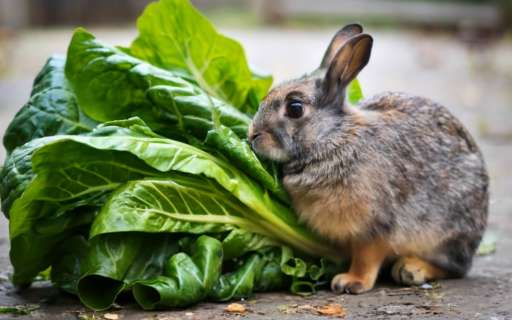
Are Swiss Chard Good for Rabbits?
Nutritional Value of Swiss Chard for Rabbits?
Swiss chard is nutritionally rich, offering vitamins A, C, and K, along with magnesium, iron, and potassium. These nutrients support a rabbit’s immune system, vision, and overall health. However, due to its oxalic acid content, it should be fed in moderation to prevent potential health issues.
How is Swiss Chard Made?
What Types of Swiss Chard Are Safe for Rabbits?
All varieties of Swiss chard, including rainbow chard and white chard, are safe for rabbits in moderation. The leaves are the safest part, while the stems can be a bit tougher for rabbits to digest. Always wash the chard thoroughly before feeding it to your rabbit to remove any pesticides or dirt.
Do Wild Rabbits Eat Swiss Chard?
Wild rabbits typically eat a variety of grasses, leaves, and vegetables they find in their natural environment. While they might nibble on Swiss chard if they come across it, it’s not a natural part of their diet. Wild rabbits usually prefer native plants and grasses over cultivated vegetables.
Why is Eating Swiss Chard Harmful to Rabbits?
Eating Swiss chard in large quantities can be harmful to rabbits because of its oxalic acid content. High levels of oxalic acid can bind with calcium in the rabbit’s system, potentially leading to kidney stones and other health issues. It’s important to feed Swiss chard sparingly to avoid these risks.
Store-bought Swiss Chard and Rabbits
Store-bought Swiss chard is generally safe for rabbits if it’s fresh and organic. Always wash it thoroughly to remove any pesticides or chemicals that might be harmful. Avoid canned or cooked chard, as these can contain added salts or preservatives that are not safe for rabbits.

Fresh Food and Digestive Issues in Rabbits
Diet Composition for Rabbits: 70% Hay, 30% Fresh Food
A rabbit’s diet should mainly consist of hay (about 70%), which provides essential fiber and helps maintain healthy digestion. Fresh vegetables and greens should make up the remaining 30%, offering vitamins and nutrients. This balanced diet supports overall health and prevents digestive issues.
Foods That Can Be Offered Without Restriction
Hay is the one food that can be offered to rabbits without restriction. It’s crucial for their digestive health and provides necessary chewing activity to keep their teeth in good condition. Fresh water should also always be available. Other foods, including fresh vegetables, should be given in moderation.
How Often Can My Rabbit Eat Swiss Chard?
Swiss chard should be offered to rabbits no more than once or twice a week. This ensures they get the nutritional benefits without risking the negative effects of oxalic acid. Always mix it with other safe vegetables to provide a varied diet.
Feeding Rabbits Fresh and Dried Fruits
Fresh fruits can be given to rabbits as occasional treats but should be limited due to their high sugar content. Apples (without seeds), berries, and bananas are good choices. Dried fruits should be avoided or given very rarely, as they are even higher in sugar and can contribute to obesity and dental problems.
Can I Give My Rabbit Dried Fruit?
No, or very seldom. Dried fruits are high in sugar, which can lead to obesity and dental issues in rabbits. If you do give dried fruit, it should be a rare treat in very small amounts. Fresh fruit is a better option but still should be given sparingly.
How Many Types of Swiss Chard Are There?
There are several varieties of Swiss chard, including red, white, and rainbow chard. Rainbow chard is a mix of different colored stems, while red and white chard have stems of their respective colors. All these varieties are nutritionally similar and can be fed to rabbits in moderation.
Observing Your Rabbit After Eating Swiss Chard
After introducing Swiss chard to your rabbit, observe them closely for any signs of digestive upset or discomfort. Look for symptoms like soft stools, lethargy, or loss of appetite. If any adverse reactions occur, discontinue feeding Swiss chard and consult your veterinarian.
What About Swiss Chard Seeds and Leaves?
For rabbits, it’s best to feed only the leaves of Swiss chard. The seeds are not suitable for rabbits and can cause digestive issues. The stems are edible but can be tough and harder to digest, so it’s safer to stick with the leaves.
Tips for Serving Swiss Chard to Bunnies
When serving Swiss chard to your rabbit, always wash it thoroughly to remove any pesticides or dirt. Offer small amounts mixed with other vegetables to ensure a balanced diet. Monitor your rabbit for any adverse reactions and adjust the amount if needed.
How Does Swiss Chard Digest in Rabbits?
Swiss chard digests relatively well in rabbits when given in small amounts. However, due to its high water content and oxalic acid, it can cause digestive upset if fed in large quantities. Introduce it slowly and watch for any signs of digestive issues.
Nutritional Benefits of Eating Swiss Chard for Rabbits
Do Rabbits Enjoy Swiss Chard Food?
Many rabbits enjoy the taste of Swiss chard, but preferences can vary. Some rabbits might love it, while others might not be interested. It’s always a good idea to offer a small amount and see how your rabbit responds before making it a regular part of their diet.
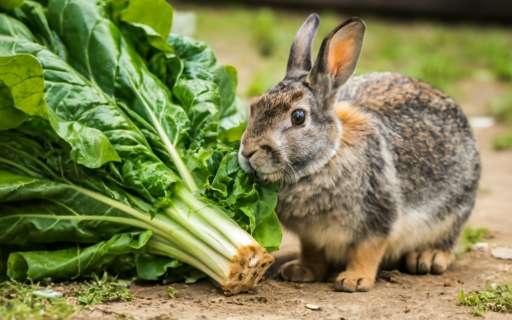
What Parts of Swiss Chard Can Rabbits Eat?
Rabbits can eat the leaves of Swiss chard safely. The stems are also edible but can be tough and harder to digest. It’s usually best to focus on the leaves and avoid the seeds altogether, as they are not suitable for rabbits.
Can Rabbits Eat Swiss Chard Seeds?
No, rabbits should not eat Swiss chard seeds. The seeds can cause digestive issues and are not suitable for their diet. Stick to the leaves and stems (in moderation) to ensure your rabbit stays healthy.
Can Swiss Chard Be Toxic to Rabbits?
Swiss chard can be harmful to rabbits if consumed in large quantities due to its oxalic acid content. While it’s not outright toxic, overfeeding can lead to health issues such as kidney stones. Feeding it in moderation and mixing it with other vegetables can help mitigate this risk.
Can Swiss Chard Cause Digestive Problems in Rabbits?
Yes, Swiss chard can cause digestive problems in rabbits if fed in large quantities. Its high water content and oxalic acid can lead to soft stools or other digestive issues. Introduce it slowly and watch for any signs of discomfort or digestive upset.
How Do You Introduce Your Bunny to Swiss Chard?
Introduce your bunny to Swiss chard slowly. Start with a small piece and observe their reaction. If they show no signs of digestive upset, you can gradually increase the amount. Always mix it with other vegetables to ensure a balanced diet.
Preparing Swiss Chard for Rabbits
To prepare Swiss chard for your rabbit, wash it thoroughly to remove any pesticides or dirt. Chop the leaves into manageable pieces and mix them with other safe vegetables. Avoid feeding large amounts at once to prevent digestive issues.
How Do Rabbits Eat Swiss Chard?
Rabbits will typically nibble on Swiss chard leaves, enjoying the tender greens. They might eat the stems too, but these can be tougher and less appealing. Always monitor your rabbit to ensure they are eating the chard without any issues.
What Happens if Rabbits Eat Too Much Swiss Chard?
If rabbits eat too much Swiss chard, they might experience digestive problems such as soft stools or stomach discomfort. The oxalic acid in Swiss chard can also pose a risk if consumed in large quantities. Always feed Swiss chard in moderation to avoid these issues.
What If My Rabbit Eats a Large Amount of Swiss Chard?
If your rabbit eats a large amount of Swiss chard, monitor them closely for any signs of digestive upset or discomfort. If you notice any adverse reactions, such as soft stools or lethargy, consult your veterinarian. It’s best to avoid overfeeding Swiss chard in the future.
How Much Swiss Chard Can My Rabbit Eat?
Rabbits should only eat a small amount of Swiss chard, about once or twice a week. This helps them get the nutritional benefits without risking the negative effects of oxalic acid. Always mix it with other safe vegetables to ensure a balanced diet.
When Shouldn’t You Feed Swiss Chard to Your Rabbit?
Avoid feeding Swiss chard to your rabbit if they have any history of kidney issues or if they show signs of digestive problems after eating it. Also, avoid feeding it in large quantities or too frequently. Always introduce new foods slowly and in moderation.
Can Baby Rabbits Eat Swiss Chard?
It’s best to wait until rabbits are older before introducing Swiss chard to their diet. Baby rabbits have more sensitive digestive systems, and introducing new foods too early can cause issues. Once they are older and used to a variety of vegetables, you can introduce Swiss chard in small amounts.
How Frequently Should Adult and Baby Rabbits Be Fed Swiss Chard?
Adult rabbits can be fed Swiss chard once or twice a week in small amounts. For baby rabbits, it’s best to wait until they are older and their digestive systems are more developed before introducing Swiss chard. Always start with small amounts and monitor for any adverse reactions.
Potential Dangers in Swiss Chard?
The main potential danger in Swiss chard for rabbits is its oxalic acid content, which can lead to kidney stones and other health issues if consumed in large quantities. It can also cause digestive upset if fed too much. Always feed in moderation and mix with other vegetables.
What If My Rabbit Accidentally Eats a Lot of Swiss Chard?
If your rabbit accidentally eats a lot of Swiss chard, watch them closely for any signs of digestive upset or discomfort. Symptoms might include soft stools, lethargy, or loss of appetite. If you notice any of these symptoms, contact your veterinarian for advice.
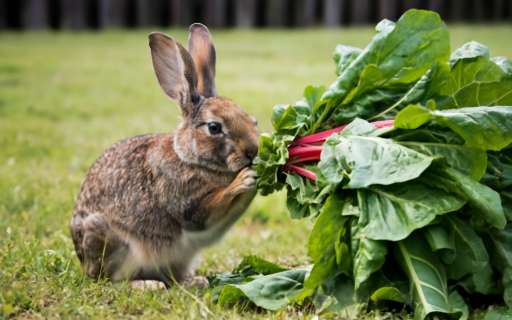
Monitoring Your Rabbit’s Health with Swiss Chard
When feeding Swiss chard to your rabbit, always monitor their health closely. Watch for any signs of digestive upset or other health issues. If your rabbit shows any adverse reactions, stop feeding Swiss chard and consult your veterinarian. Regular monitoring helps ensure your rabbit stays healthy.
Incorporating Fresh Greens and Vegetables
Incorporating fresh greens and vegetables into your rabbit’s diet is important for their health. Along with Swiss chard, offers a variety of safe vegetables like romaine lettuce, cilantro, and basil. This variety ensures they get a range of nutrients while preventing overconsumption of any one vegetable.
What Actions Should I Take if My Rabbit Consumes Swiss Chard?
If your rabbit consumes Swiss chard, monitor them for any signs of digestive upset or discomfort. If they show no adverse reactions, you can continue to offer it in small amounts. If any issues arise, stop feeding Swiss chard and consult your veterinarian.
Creating a Balanced Diet with Swiss Chard
To create a balanced diet with Swiss chard, offer it alongside other safe vegetables and a constant supply of hay. This ensures your rabbit gets a variety of nutrients without overloading on any one food. Moderation and variety are key to maintaining your rabbit’s health.
My Rabbit Ate a Whole Swiss Chard?
If your rabbit ate a whole Swiss chard, monitor them for any signs of digestive upset or discomfort. They might likely experience some soft stools or stomach discomfort. Keep an eye on them and contact your veterinarian if any serious symptoms arise.
Can Rabbits Eat Wild Swiss Chard?
Wild Swiss chard is generally similar to the cultivated varieties and can be fed to rabbits in moderation. However, ensure that it hasn’t been exposed to pesticides or other harmful substances. Always wash it thoroughly before offering it to your rabbit.
What Else Can I Feed My Rabbit Besides Swiss Chard?
In addition to Swiss chard, you can feed your rabbit a variety of other vegetables like romaine lettuce, cilantro, basil, and carrots in moderation. Fruits like apples (without seeds) and berries can be given as occasional treats. Always ensure a constant supply of hay and fresh water.
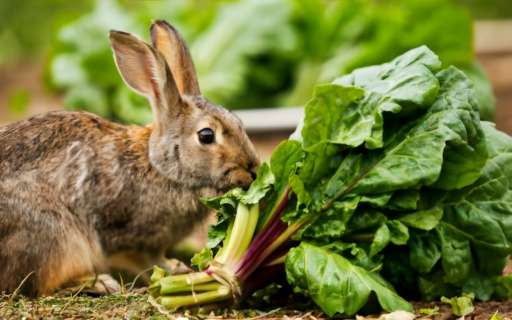
How to Create a Rabbit-Friendly Garden?
To create a rabbit-friendly garden, plant a variety of safe vegetables and herbs such as romaine lettuce, cilantro, and basil. Avoid plants that are toxic to rabbits. Provide a secure, enclosed space to protect your rabbit from predators and ensure they have access to fresh water.
Swiss Chard Feeding Guidelines and Amounts
When feeding Swiss chard to your rabbit, offer it in small amounts once or twice a week. Mix it with other safe vegetables to ensure a balanced diet. Monitor your rabbit for any signs of digestive upset and adjust the amount if needed. Always wash the chard thoroughly before feeding.
Rabbit Treats Made at Home with Swiss Chard
You can make homemade rabbit treats using Swiss chard by mixing it with other safe vegetables and forming small, rabbit-friendly portions. Always ensure the ingredients are safe and given in moderation. Homemade treats can be a fun and nutritious way to add variety to your rabbit’s diet.
Conclusion
FAQs
Can rabbits eat Swiss chard daily?
No, Swiss chard should be fed sparingly, about once or twice a week.
Is Swiss chard toxic to rabbits?
No, but its oxalic acid content can cause issues if fed in large amounts.
What part of Swiss chard is safe for rabbits?
The leaves are safest; stems can be tough to digest.
Can baby rabbits eat Swiss chard?
It’s best to wait until they’re older and introduce it gradually.
What are good alternatives to Swiss chard for rabbits?
Romaine lettuce, cilantro, and basil are safe alternatives.
How should I prepare Swiss chard for my rabbit?
Wash thoroughly and chop into small pieces.
